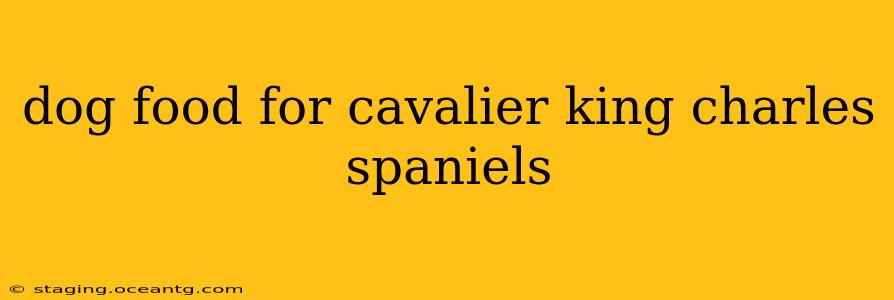Cavalier King Charles Spaniels, with their charming personalities and elegant appearance, deserve the best nutrition to thrive. Choosing the right dog food is crucial for maintaining their health, energy levels, and overall well-being. This comprehensive guide will help you navigate the world of dog food and select the ideal diet for your beloved Cavalier.
What Makes a Good Dog Food for Cavaliers?
Cavalier King Charles Spaniels, while generally healthy, are prone to certain health issues. Therefore, their diet should address these potential concerns. A high-quality dog food for Cavaliers should:
- Be formulated for small breeds: Small breeds have different nutritional needs than larger breeds. Look for foods specifically designed for small breeds, which often have smaller kibble sizes and adjusted calorie content.
- Contain high-quality protein: Protein is essential for muscle development and maintenance. Opt for foods with named meat sources (e.g., chicken, lamb, salmon) as the primary ingredient, not just "meat by-products."
- Include healthy fats: Fats provide energy and support skin and coat health, crucial for a Cavalier's luxurious coat. Look for sources like fish oil or chicken fat.
- Be low in carbohydrates: Cavaliers are prone to weight gain, so a food with moderate carbohydrate content can help manage their weight.
- Contain added supplements: Consider foods with added glucosamine and chondroitin to support joint health, as Cavaliers are prone to joint issues like syringomyelia and mitral valve disease. Probiotics can also improve digestion.
What to Avoid in Cavalier King Charles Spaniel Dog Food?
Just as important as what to include is what to avoid. Some ingredients should be avoided in your Cavalier's diet:
- Artificial colors, flavors, and preservatives: These additives offer no nutritional value and may contribute to allergies or other health problems.
- Fillers like corn, wheat, and soy: These provide minimal nutritional value and can lead to digestive issues.
- Excessive carbohydrates: As mentioned, excessive carbs can contribute to weight gain and other health problems.
What are the best ingredients for a Cavalier King Charles Spaniel's diet?
The ideal ingredients list for your Cavalier's food should emphasize:
- High-quality protein sources: Chicken, turkey, lamb, salmon, or other easily digestible proteins.
- Healthy fats: Salmon oil, flaxseed oil, or other sources of omega-3 and omega-6 fatty acids.
- Fruits and vegetables: These provide essential vitamins and minerals. Look for named fruits and vegetables, not just vague terms.
- Prebiotics and probiotics: To support gut health and digestion.
What are some good brands of dog food for Cavalier King Charles Spaniels?
Many reputable brands offer dog food suitable for Cavaliers. Research different brands and read reviews to find one that fits your dog's individual needs and your budget. Remember to always consult your veterinarian before making significant changes to your dog's diet.
Are there specific dietary needs for Cavalier King Charles Spaniels with health issues?
H2: My Cavalier King Charles Spaniel is overweight. What should I feed them?
If your Cavalier is overweight, you need to consult your vet. They can help you determine the appropriate calorie intake and recommend a diet plan. This often involves switching to a lower-calorie, higher-protein food and increasing exercise.
H2: What dog food is best for a senior Cavalier King Charles Spaniel?
Senior Cavaliers benefit from senior-specific formulas designed to support their aging bodies. These often have increased levels of glucosamine and chondroitin for joint health, as well as adjusted protein and calorie levels.
H2: My Cavalier King Charles Spaniel has sensitive skin. What kind of food should I use?
For Cavaliers with sensitive skin, look for foods with limited ingredients, often labelled "hypoallergenic" or "sensitive skin." These formulas typically use novel protein sources (like duck or venison) and limited carbohydrates to minimize skin irritation.
Conclusion
Choosing the right food for your Cavalier King Charles Spaniel is an investment in their long-term health and happiness. By carefully considering their breed-specific needs and potential health concerns, and consulting your veterinarian, you can provide your furry friend with the optimal nutrition for a long, healthy, and joyful life. Remember that consistency is key – once you find a food that works well, stick with it unless your vet advises otherwise.
